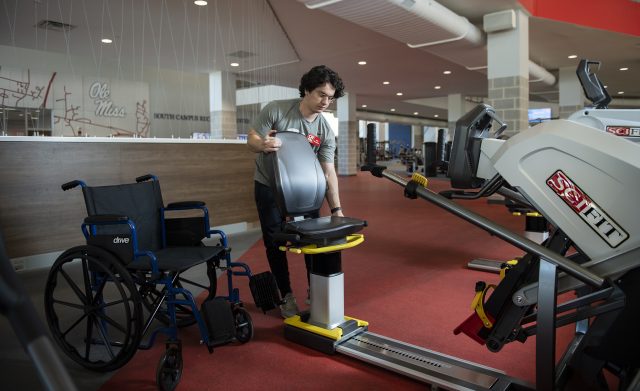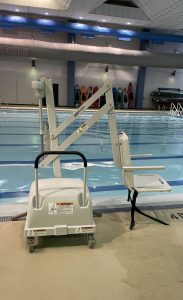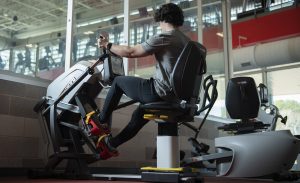
Alex Gruneiro, a public health graduate student and campus recreation graduate assistant from Papillion, Nebraska, demonstrates one of the weight machines in the South Campus Recreation Center that adjust to be more accessible to people of multiple abilities and fitness levels. Photo by Logan Kirkland/Ole Miss Digital Imaging Services
OXFORD, Miss. – The University of Mississippi‘s Inclusive Recreation Committee is asking students how it can be more accommodating and help everyone on campus have opportunities to achieve their highest level of health.
The Department of Campus Recreation implements best practices and provides equipment and facilities for people across multiple ability levels and identities, but it likely doesn’t meet every single student’s needs, said Shannon Richardson, assistant director of campus recreation.
“Come tell us what you need, and we will show you that we’ve got something for you,” Richardson said. “And if we don’t, we’ll work with you to figure it out.”
The committee meets monthly to push the department to be more welcoming, accessible and equitable, and reviews accessibility feedback forms submitted. The forms give campus community members an opportunity to request facilities, programs and accommodations, as well as offer feedback on larger accessibility and inclusivity issues with the goal of providing the best possible recreation experience.

The university’s natatorium features two aquatic lifts to assist patrons in entering the deep end, lap lane and shallow end of the pool. The pool also features an AquaStep ADA system in the shallow, and all entrance doors and locker room doors have ADA automatic door openers. Submitted photo
Breanna Foreman, a graduate student in public health and member of the Inclusive Recreation Committee, sees fitness, sports and outdoor group activities as ways for people from all backgrounds, identities and abilities to come together and promote health while having fun. But with many different backgrounds come many different needs.
“Our responsibility is twofold,” she said. “In terms of programming and equipment, we have to provide nontraditional opportunities and meet people where they are.
“But we also want to make students feel comfortable advocating for what they’d like to see or tell us why they haven’t been involved. That gives us ideas for how we can help.”
The department offers many accessibility accommodations, including ADA lockers, adaptable SciFit cardio machines, adaptable aquatic equipment, climbing wall and challenge course accommodations, accommodations for nursing parents, and family and individual locker room spaces.
“We know we’re not perfect and don’t have everything everyone needs,” Richardson said. “No one person represents an entire group and no group represents an individual, which is why we want students to know they can come to us.”
Mason Fleming, a sports and recreation graduate student from Bristol, Tennessee, and member of the committee, said he was drawn to the group because he thinks everyone deserves access to resources that build healthier behaviors and lifestyles.
“I think college is really about growing your independence and finding out more about who you are,” Fleming said. “You get challenged by academics but also by leaving your comfort zone.
“If Campus Recreation, and the University of Mississippi as a whole, can make an environment where everyone feels welcome, then we’re helping to build lifelong healthy habits and we’re promoting healthy choices. I would hate to push anyone away by our actions, language or just because we weren’t open enough to learn something new.”

The SciFit cardio machines at the South Campus Recreation Center are part of the Department of Campus Recreation’s effort to make fitness and recreation accessible to all. Photo by Logan Kirkland/Ole Miss Digital Imaging Services
Alex Gruneiro was a self-described short, underweight kid.
“I was so skinny in high school that you could see my heart beat,” said Gruneiro, a public health graduate student from Papillion, Nebraska. “It didn’t matter how much I ate or lifted or what I did.”
But in college, he got involved in recreation and made friends who helped get into weightlifting and building healthy behaviors. That’s when he knew he wanted to do the same thing for someone else.
“I want people to feel like they can be represented and know there is someone in their corner in campus recreation who is excited about getting them excited about fitness.”
The Inclusive Recreation form, available on the committee’s website, is fast and easy to fill out, and can even be completed anonymously. However, Richardson said she hopes anyone who submits a form will consider including their contact information so the committee can be sure the issue is addressed specifically and completely.